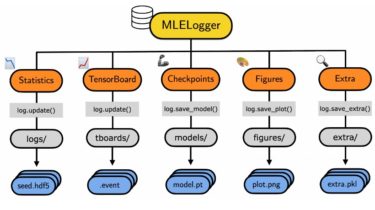A Lightweight Logger for Machine Learning Experiments

A Lightweight Logger for ML Experiments
Simple logging of statistics, model checkpoints, plots and other objects for your Machine Learning Experiments (MLE). Furthermore, the MLELogger comes with smooth multi-seed result aggregation and combination of multi-configuration runs.
The API 🎮
from mle_logging import MLELogger
# Instantiate logging to experiment_dir
log = MLELogger(time_to_track=['num_updates', 'num_epochs'],
what_to_track=['train_loss', 'test_loss'],
experiment_dir="experiment_dir/",
model_type='torch')
time_tic = {'num_updates': 10, 'num_epochs': 1}
stats_tic = {'train_loss': 0.1234, 'test_loss': 0.1235}
# Update the log with collected data & save it to .hdf5
log.update(time_tic, stats_tic)
log.save()
You can also log model checkpoints, matplotlib figures and other .pkl compatible objects.
# Save a model (torch, tensorflow, sklearn, jax, numpy)
import torchvision.models as models
model = models.resnet18()
log.save_model(model)
# Save a matplotlib figure as .png
fig, ax = plt.subplots()
log.save_plot(fig)